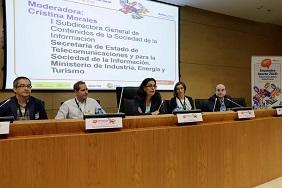
Framed within the program previous to the International Open Data Conference, the agenda of Encuentro Aporta has been aligned to IODC sessions. To that end, the last session was about the global and local actions related to five key areas in the open data roadmap: standards, capacity and skill development, innovation, impact and achievements measurement and Open Data Charter principles. In order to share opinions and experiences in those fields, a group of national experts from national and international sectors were gathered.
Esther Minguela, CEO of Localidata, was the person in charge of talking about the importance of homogenization in the openness of data. According to the expert, without standards open data only offer a part of their value, so it is necessary a common language that promotes the flow of goods.
After her speech, Oscar Corcho explained how important is training in the reuse of open data according to the needs of each stakeholder: from student at any educational level, to specific groups such as data journalisms or, even, public officials.
Later, it was the turn of Miguel García from Zabala Innovation Consulting, a company expert on innovation projects based on open data. Nowadays, according to Zabala, the European inversion on open data is about 440 million euros, through different programs and financial rounds for European companies such as ODINE, Horizone2020 or the accelerator FINODEX that, through a number of calls, supports economically small and medium open data enterprises in the European Union. Thanks to these initiatives, the EU keeps inverting on the future and offers new opportunities to entrepreneurs who use open data as the resource for their projects.
Once again, Carlos Iglesias took part in Encuentro Aporta as a speaker; in this occasion, the expert shared his knowledge on indicators to assess the evolution of open data initiatives. After his collaboration in the Open Data Barometer, Carlos Iglesias explained the operation of this international study framework which analyses the maturity of open data policies according to the principles of Open Data Charter; he shared with the attendees the conclusions reached, highlighting that though open data is a global tendency, the availability of real open data is still limited.
Finally, Victoria Anderica from Madrid City Council, was the person chosen to discuss about the Open Data Charter in the field of openness and reuse of public sector information and the role of this agreement within the Madrid’s open data initiative. In this regard, Anderica confirmed that the city has signed the Open Data Charter, promising to follow the open data guidelines included in this global agreement and explaining that the following challenge of this public body will be publishing more data and making them more accessible to promote the transparency of the local government.
